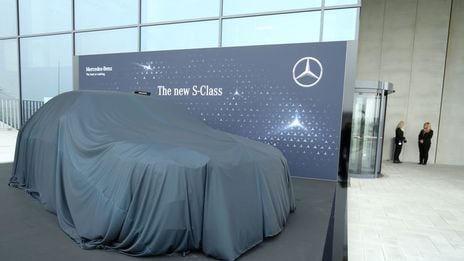The road to electromobility will be up and down, said CEO Ola Källenius in Stuttgart on Thursday. The DAX-listed company will continue to drive forward its goal of CO2 neutrality by 2039 with high investments in new e-cars. But the company needs to protect itself in two ways. "We need tactical flexibility." The combustion engine will be available until the 1930s, as customer demand will determine the pace of the transition.
As a new strategic goal, the car manufacturer named a share of electrified cars, i.e. pure e-cars and hybrid models, of up to 50 percent by 2030. Previously, the manufacturer considered itself ready for 100 percent electric car sales - given the right market conditions. However, demand is less dynamic than expected three years ago, said Källenius. Last year, the goal of doubling the proportion of e-car sales had to be abandoned. The EQ models and the electric Smart increased by a good 60 percent to around 241,000 cars. That was twelve percent of sales. This year, every fifth new car is to be "electrified". Källenius does not give a specific sales target for purely electric cars for 2030. "That doesn't make sense, nobody can say that."
With recently updated combustion engines that have to meet stricter emissions regulations in Europe, China and the USA by 2027, Mercedes believes it is well positioned. Investments in new platforms for conventional drive systems are not planned. With a view to the European Union's decision to phase out the combustion engine by 2035, Källenius called for a rational discussion on whether the requirements are keeping pace with the ambition in the review scheduled for 2026. In addition to new cars with fast-charging batteries, the charging infrastructure and the supply of green electricity are decisive factors in the transition to sustainable transportation.
The new direction was well received by analysts. The original target was not realistic, said Pal Skirta, automotive analyst at private bank Metzler. "Mercedes management understands that the switch to electric cars is not happening as quickly as expected." Politicians in Europe will probably also have to adjust their targets.
CAUTIOUS OUTLOOK
Last year, the slump in the car market and production problems caused Mercedes' profits to shrink. For the current year, a further decline is expected with stable Group turnover and car sales. "We are cautious in view of restrictions in the supply chain and the subdued market environment," said CFO Harald Wilhelm. Uncertainty in the economy as a whole and in the car market is unusually high. Production problems at the supplier Bosch with 48-volt systems for combustion engines slowed down the Swabian company's important GLC and E-Class passenger car models last year, resulting in a shortfall of around 100,000 vehicle sales. These can only be made up from the second quarter, when the bottleneck should be resolved.
The operating result (EBIT) fell by four percent to 19.7 billion euros in 2023 with a slight increase in turnover to 153.2 billion euros. Below the line, the Stuttgart-based group earned 14.5 billion euros, two percent less than in 2022. EBIT is expected to fall slightly in the current year, which corresponds to a minus of between five and 15 percent. The return on sales in the main passenger car division continues to erode: after a two percentage point drop to a "solid" 12.6 percent last year, Mercedes is targeting ten to twelve percent in 2024. The smaller van division increased its profit by almost two thirds to around three billion euros. The margin shot up to 15.5 percent from eleven percent. This year, the division is expecting lower sales and a less generous return of 12 to 14 percent.
INVESTORS CELEBRATE SHARE BUYBACK
Despite the sobering outlook, the share price rose by around six percent to 72 euros. Investors took advantage of the fact that Mercedes-Benz increased its dividend by ten cents to 5.30 euros and announced a new share buyback program with a volume of three billion euros. CFO Wilhelm announced that investors would continue to participate in the company's cash flow in both ways. What is left over after distributing dividends and financing smaller acquisitions will be used to buy back shares in future. "This shows that the management is handling the money sensibly and that it is not being wasted on unrealistic projects," praised analyst Skirta.
(Edited by Olaf Brenner. If you have any queries, please contact the editorial team at frankfurt.newsroom@thomsonreuters.com)
- by Ilona Wissenbach











